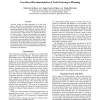Free Online Productivity Tools
i2Speak
i2Symbol
i2OCR
iTex2Img
iWeb2Print
iWeb2Shot
i2Type
iPdf2Split
iPdf2Merge
i2Bopomofo
i2Arabic
i2Style
i2Image
i2PDF
iLatex2Rtf
Sci2ools
110
click to vote
FLAIRS
2007
2007
Case-Based Recommendation of Node Ordering in Planning
Currently, among the fastest approaches to AI task planning we find many forward-chaining heuristic planners, as FF. Most of their good performance comes from the use of domain-independent heuristic functions, together with efficient search techniques. When analysing their performance, most of the time is spent precisely on computing the heuristic value of nodes. The goal of this paper is to present a way of reducing the number of calls to the heuristic function, and, therefore, the time spent on finding a solution. We use a case-based reasoning approach that automatically acquires domain-dependent typed sequences (cases) from some training problems. Then, the learned cases are used to recommend to each search node which of its successors to evaluate first. Experimental results in several competition domains show the advantages of the approach.
Artificial Intelligence | FLAIRS 2007 | Forward-chaining Heuristic Planners | Heuristic | Heuristic Function |
| Added | 02 Oct 2010 |
| Updated | 02 Oct 2010 |
| Type | Conference |
| Year | 2007 |
| Where | FLAIRS |
| Authors | Tomás de la Rosa, Angel García Olaya, Daniel Borrajo |
Comments (0)

